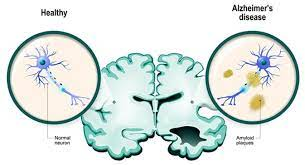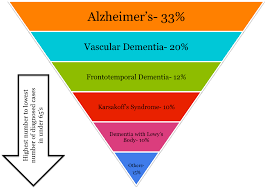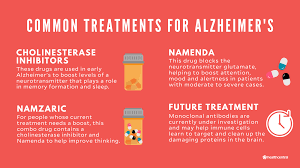Alzheimer Early Onset: Know All About And The Best Treatment
Alzheimer's disease is a degenerative condition that impairs memory and other critical mental abilities. Memory and other mental processes are gradually lost when brain cell connections and cells deteriorate and die.
Confusion and a lack of memory are the most prominent signs. Although there is currently no cure, drugs and management techniques may help alleviate symptoms.
What is early onset Alzheimer's disease?
The most frequent kind of dementia is Alzheimer's disease. Memory, reasoning, and conduct are all impacted. It's not uncommon for it to worsen to the point that it interferes with day-to-day activities.
People in their 30s and 40s may also be affected by Alzheimer's disease, which is more frequent among the elderly. Early onset Alzheimer's (or younger-onset) disease is a term used to describe when Alzheimer's disease first manifests in someone under the age of 65.
Alzheimer's disease with early onset affects a tiny percentage of the population. Many of them are in their 40s and 50s at the time of the sickness.
A few minor variations exist among the many forms of Alzheimer's disease that manifest in the early stages of life.
Alzheimer's illness is quite common. The typical type of Alzheimer's disease affects the majority of persons with early-onset Alzheimer's disease. In elderly persons, the illness advances in a similar manner.
Alzheimer's illness runs in families. This particular incarnation is quite uncommon. Only a small number of individuals have genes that put them at risk for developing Alzheimer's disease. People in their 30s, 40s, and 50s are the most likely to get the condition.
What are the symptoms of early-onset Alzheimer's disease?
When it comes to Alzheimer's, the symptoms of early-onset Alzheimer's disease are quite similar to those of other kinds.
- The first signs:
- Memory loss, especially when it comes to recently acquired facts or key dates.
- The habit of repeating the same questions
- Basic issues, such as keeping track of payments or following a beloved recipe, are difficult for you to solve.
- Inability to keep track of the time or date.
Lost your bearings and don't know what route to take?
The trouble with depth perception or other eye-related issues. Having a hard time getting into talks or finding the correct phrase for a certain topic
- Retracing your steps to locate stuff that you've misplaced.
- Poor decision-making is becoming more common.
- Reluctance to participate in work and social events
- mood swings, as well as personality shifts
- Symptoms that may appear in the future include:
- Extreme emotional and behavioral shifts
- Confusion about time, location, and life events is escalating.
- The suspicions of friends, relatives, or caretakers
- The inability to talk, swallow or walk
- Shocking memory lapses
How is early-onset Alzheimer's disease diagnosed?
Early-onset Alzheimer's disease is now diagnosed by looking for the indicators of mental impairment described above. After that, your doctor may do a few tests to determine whether you have Alzheimer's disease.
Once your health history and cognitive tests have been completed, your healthcare professional will ask you questions regarding your current health status as well as your mental abilities.
Your physician may also suggest that you undergo further testing with a neuropsychologist if the findings of the office-based cognitive testing are not satisfactory.
Your blood, urine, and spinal fluid may also be tested by your healthcare professional. CT and MRI scans of the brain may also be necessary. These allow your doctor to have a better look at the brain tissue to determine the extent of the injury.
Biomarker studies, researchers think, will speed up illness diagnosis in the future. There are a variety of biomarkers that may be used to track the progression of a disease.
How is early-onset Alzheimer's disease treated?
There is no cure for early-onset Alzheimer's disease at this time. Even so, medical professionals have been able to delay the progression of the illness and enable patients to keep their mental function.
Mental health medications assist patients in maintaining their health and well-being. They consist of:
- Donepezil\sRivastigmine\sGalantamine\sMemantine
- There has been a mixed bag of results.
- But these drugs seem to assist patients with their symptoms for anywhere from a few months to a few years at the most.
Alzheimer's disease may be slowed by a variety of therapies, including physical exercise, cardiovascular and diabetic medication, antioxidants, and cognitive training. There are several studies being conducted in this field, and new information regarding Alzheimer's disease is being cleaned daily.
Is there a way to prevent Alzheimer's disease from developing in those who are still young?
Alzheimer's disease can't be prevented, according to experts. Early detection of the condition has recently been shown to lead to improved treatment choices, according to some recent data.
If you see any of the early warning symptoms listed above, don't hesitate to get in touch with your healthcare practitioner.
- Alzheimer's disease is in its early stages
- Alzheimer's disease that develops slowly over time may be a challenging condition to deal with.
- Keep a good attitude and try to keep your mind and body busy and engaged.
It's also crucial to remember that you're not the only one going through this. Make as many calls to loved ones as you can.
If you think it might be beneficial, don't be hesitant to look for a support group. It's vital to consider the future while the illness is still in its early stages.
As part of this process, you'll need to engage with your present and future employers to explain your job duties, as well as ensure that you have all of your crucial paperwork in order if your health takes a turn for the worse.
Keep your mind and body as healthy as possible despite the lack of a treatment for Alzheimer's disease. Dietary changes, exercise, alcohol reduction, and stress reduction strategies may all be part of this.
When should I make an appointment with my doctor?
In the same way, as with any other ailment, it's necessary to monitor your health. Whenever you observe a sudden change in your health or the health of someone you care for, contact your healthcare practitioner. Your healthcare practitioner can help you figure out the next actions.
Early-onset Alzheimer's disease: everything you need to know. Although Alzheimer's disease is most frequently associated with the elderly, it may strike anybody in their 30s or 40s with early-onset Alzheimer's disease.
- It has a negative impact on people's memory, thinking, and actions.
- Despite the lack of a cure, early detection and treatment have been shown to improve overall health and well-being.
- Maintain a healthy lifestyle by eating well and exercising regularly.
- Don't drink alcohol or use any other drugs that might impair your memory, judgment, or actions in any way.
- Steps to follow to make the most of your healthcare provider's visit:
- Know why you're there and what you want to accomplish.
- Make a list of the things you want to know ahead of time.
In order to ask the right questions and remember what your doctor tells you, bring a friend or family member with you.
Some other best blogs are alcohol calories | Depression treatment | Back Pain solution
Make a note of any new diagnoses, medications, treatments, or tests you get during your appointment. Any new instructions from your provider should also be included in your logs
If you are recommended a new medication or therapy, be sure you understand why and how it will benefit you. Make sure you're aware of any potential negative consequences as well.
- Find out if there are any alternative options for treating your disease.
- Make sure you understand why a test or treatment is necessary and what the findings may signify.
- If you don't take the drug or get the test or operation, know what to anticipate.
- A reminder is especially useful if you know you'll be returning for a second session.
- If you have any questions, make sure you know who to contact at your provider.
What causes early-onset Alzheimer's disease?
The cause of Alzheimer's disease is unknown to scientists. They believe that two proteins are responsible for causing nerve cell damage and death.
Plaques are the result of the accumulation of fragments of a single protein, beta-amyloid. Tau tangles are twisted tau protein fibers. Plaques and tangles are a normal part of aging for almost everyone.
People with Alzheimer's disease, on the other hand, develop an enormous number. Plaques and tangles in the brain's memory centers cause short-term memory loss.
They spread to additional parts of the brain with time. Researchers are baffled as to why and how certain individuals acquire such an abundance of plaques and tangles in their brains.









Comments
Post a Comment